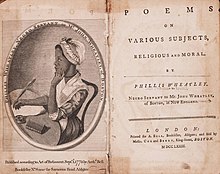Poems on Various Subjects, Religious and Moral

Title page and frontispiece of the 1st edition
|
|
| Country | England |
|---|---|
|
Publication date
|
1 Sept 1773 |
| Text | at |
Poems on Various Subjects, Religious and Moral by Phillis Wheatley, Negro Servant to Mr. John Wheatley, of Boston, in New England (published 1 September 1773) is a collection of 39 poems written by Phillis Wheatley the first professional African-American woman poet in America and the first African-American woman whose writings were published.
Phillis Wheatley broke barriers as the first American black woman poet to be published, opening the door for future black authors. James Weldon Johnson, author, politician, diplomat and one of the first African-American professors at New York University, wrote of Wheatley that "she is not a great American poet—and in her day there were no great American poets—but she is an important American poet. Her importance, if for no other reason, rests on the fact that, save one, she is the first in order of time of all the women poets of America. And she is among the first of all American poets to issue a volume."
Phillis Wheatley had gathered 28 poems and ran advertisements searching for subscribers in Boston newspapers in February 1772 with the aid of her mistress, Mrs. Wheatley. Unable to find a publisher in the American colonies, as it was common among the white educated colonial elite in America to a perceive a racial superiority of whites over blacks. This belief was also held among prominent Enlightenment thinkers, among them David Hume who wrote that "I am apt to suspect the Negroes, and in general all the other species of men (for there are four or five different kinds) to be naturally inferior to the whites" and Immanuel Kant who believed that "[t]he Negroes of Africa have by nature no feeling that rises above the trifling." Black Africans were thought unable to reason and therefore only fit for manual labor, and could not produce literature or poetry as they required higher cognitive ability. They looked to London for a publisher more favorable towards poetry authored by an African slave. Wheatley sent her poem On the Rev. Mr. George Whitefield, which had previously brought her national attention, to Selina Hastings, Countess of Huntingdon, a Calvinist evangelist, who had been a member of Whitefield's parish. She directed Wheatley to a Bostonian bookseller, Archibald Bell, London's foremost bookseller and printer. Bell replied that since Phillis was a slave, he would need proof that she had written the poems herself. It therefore became necessary for Phillis, her master, John Wheatley, as well as many respectable members of Boston to explain how a slave had come to read and write poetry, and to convince readers that work was truly Wheatley's own.
...
Wikipedia
